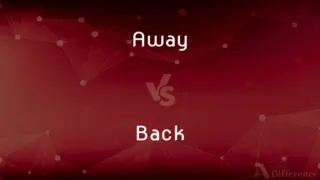Involved On vs. Involved In — What's the Difference?
By Tayyaba Rehman — Published on October 4, 2023
"Involved on" is often used to refer to involvement with specific days or dates, while "Involved in" typically refers to being engaged with activities, projects, or situations.

Difference Between Involved On and Involved In
Table of Contents
ADVERTISEMENT
Key Differences
"Involved on" and "Involved in" are prepositional phrases used to describe the state of being part of something or participating in something, but they have different applications and usages. "Involved on" is less commonly used, typically referring to involvement occurring on specific days or dates. For instance, one might say, "I am involved on Mondays," to mean they have commitments on that day. On the other hand, "Involved in" is a more common expression, signifying participation or engagement in activities, projects, or situations.
Understanding the contextual difference between "Involved on" and "Involved in" is crucial for precise communication. "Involved on" is often restrictive, mainly relating to temporal aspects, such as days or dates, whereas "Involved in" is more versatile, covering a broad range of involvements including activities, fields, and areas of interest. For example, one might be "involved in volunteering," indicating a commitment to volunteer work, irrespective of the time or day it occurs.
Using "Involved on" or "Involved in" appropriately ensures clarity in expression. "Involved on" typically precedes specific points in time, signaling involvement at particular instances, while "Involved in" precedes activities or situations, indicating a more generalized participation. It is the subtlety in their applications that distinguishes them, contributing to the richness and precision of language.
Choosing between "Involved on" and "Involved in" depends on the nature of participation one wishes to convey. If the involvement is specific to a date or day, "Involved on" is suitable. If the involvement is with an activity or situation, regardless of when it occurs, "Involved in" is the apt choice. These expressions, though seemingly similar, play distinct roles in articulating involvement effectively.
Comparison Chart
Typical Usage
Specific days or dates
Activities, projects, or situations
ADVERTISEMENT
Context
Temporal
General
Frequency of Usage
Less common
More common
Example
"I'm involved on Fridays."
"I'm involved in volunteer work."
Flexibility
Restricted to time-related contexts
Versatile and used in varied contexts
Compare with Definitions
Involved On
Implies participation or active engagement on certain dates or days.
The committee is involved on the first day of every month in meetings.
Involved In
Suggests being part of or engaged in particular activities or situations.
The team is actively involved in environmental conservation projects.
Involved On
Denotes being actively engaged or committed on specified days.
The club is heavily involved on holidays in organizing events.
Involved In
Signifies active engagement or participation in various activities or areas.
He is deeply involved in community service and outreach programs.
Involved On
Indicates participation or engagement occurring on particular days.
He is always involved on Saturdays with community service.
Involved In
Denotes participation or engagement in specific projects or activities.
The club is involved in organizing cultural events throughout the year.
Involved On
Suggests active involvement or commitment on specific times or dates.
The team is involved on every alternate Sunday for a cleanup drive.
Involved In
Indicates being engaged or participating in activities, projects, or situations.
She is involved in many volunteer activities around the city.
Involved On
Refers to being engaged or committed on specific days or dates.
She is usually involved on the weekends volunteering at the shelter.
Involved In
Implies being engaged or having a role in particular activities or areas.
She has been involved in animal rescue initiatives for several years.
Common Curiosities
Which phrase is more common, “Involved On” or “Involved In”?
“Involved In” is more commonly used than “Involved On.”
Can “Involved On” be used to indicate involvement in activities?
It is usually specific to times, such as days or dates, and not typically used for activities.
Is “Involved In” used to indicate involvement on specific dates?
No, it usually indicates participation in activities or situations, not specific dates.
Can “Involved In” be used in varied contexts?
Yes, “Involved In” is versatile and can be used in a variety of contexts to indicate engagement in activities or situations.
Is “Involved On” versatile in usage?
No, “Involved On” is more restrictive and is typically used in temporal contexts.
Does “Involved On” precede specific points in time?
Yes, “Involved On” typically precedes specific points in time, indicating involvement at particular instances.
What does “Involved On” typically refer to?
It typically refers to being engaged or committed on specific days or dates.
Can “Involved In” imply engagement in a project?
Yes, “Involved In” is apt for implying engagement or participation in a project.
What does “Involved In” generally signify?
It generally signifies being engaged or participating in activities, projects, or situations.
Is “Involved On” suitable for indicating involvement in a situation?
It is generally not suitable for indicating involvement in situations, it is more suited to specify days or dates of involvement.
Can “Involved In” denote generalized participation?
Yes, “Involved In” can denote more generalized participation in activities or situations.
Share Your Discovery

Previous Comparison
Away vs. Back
Next Comparison
Chill vs. EnjoyAuthor Spotlight
Written by
Tayyaba RehmanTayyaba Rehman is a distinguished writer, currently serving as a primary contributor to askdifference.com. As a researcher in semantics and etymology, Tayyaba's passion for the complexity of languages and their distinctions has found a perfect home on the platform. Tayyaba delves into the intricacies of language, distinguishing between commonly confused words and phrases, thereby providing clarity for readers worldwide.











































